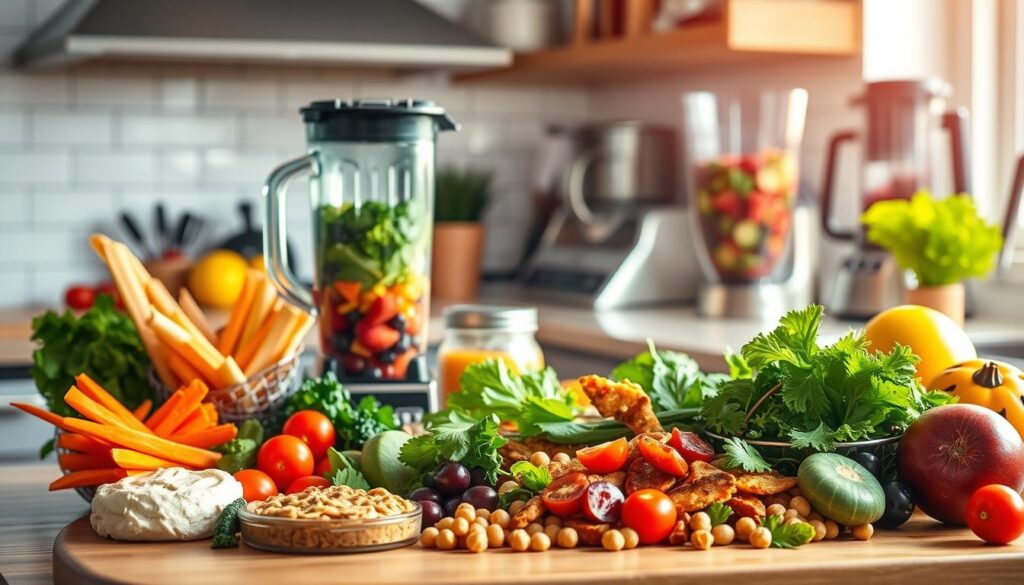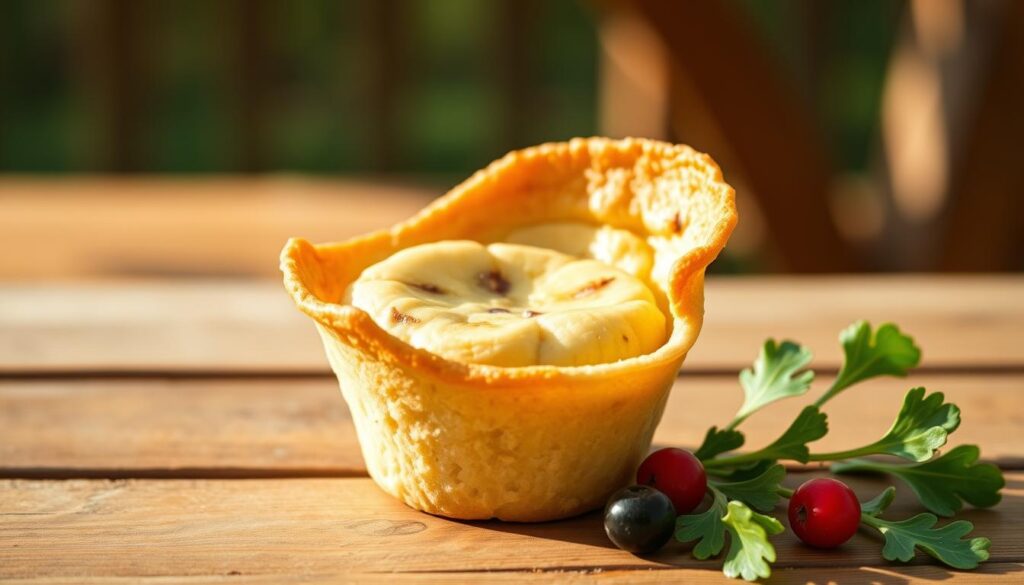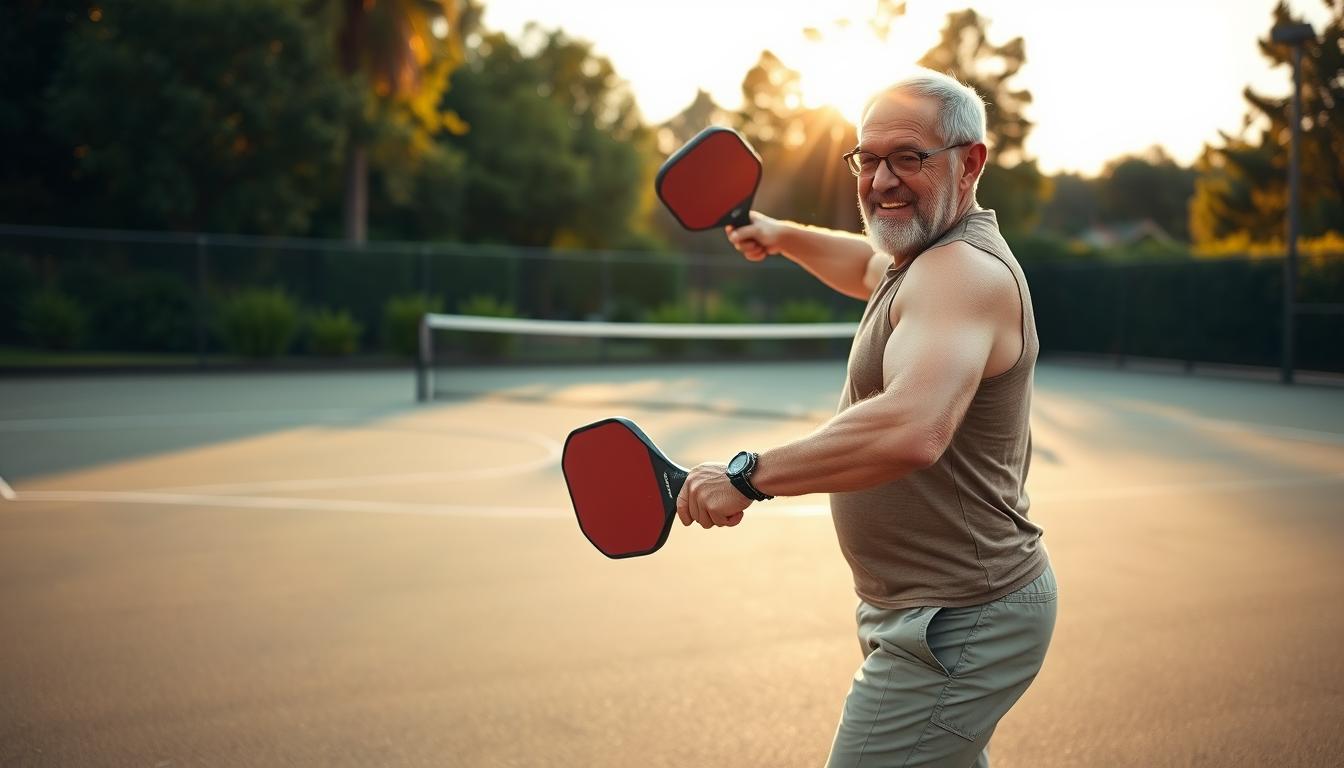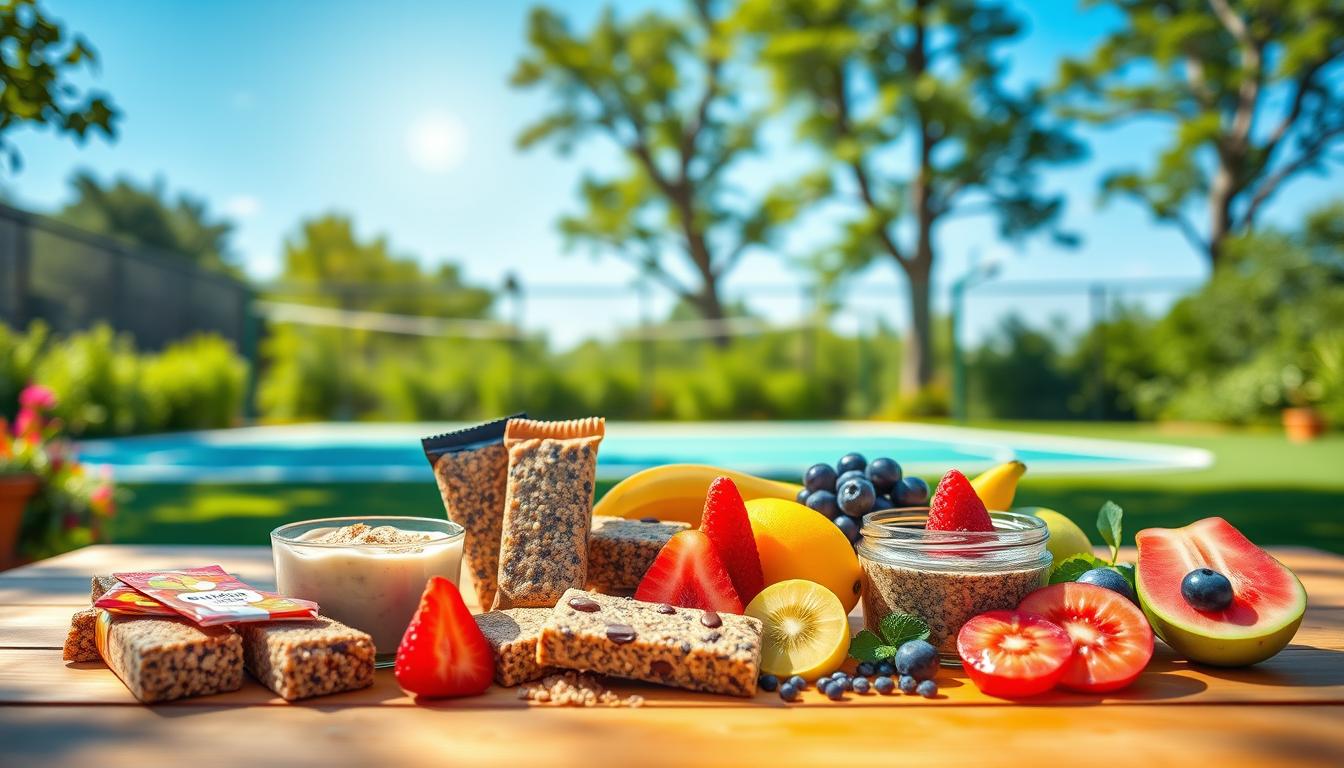Can a few smart bites really keep you sharp from first serve to final rally? The short answer is yes. With the right plan, simple plant-based foods can boost on-court energy and support recovery.
Nutrition can lift performance by up to 20% compared with poor diets, so what you eat matters. Focus on carbs for quick fuel, protein for repair, and fats for hormone and joint support.
These ideas are fast, portable, and easy to digest. They fit morning warm-ups, midday drop-ins, or tournament days. Think soy milk or nut butter swaps for dairy milk and butter, and dairy-free cheese when you want that flavor.
Throughout the day aim for smaller bites close to play and fuller combos further out. This section previews pre-game carb-first bites, on-court hydration with electrolytes, and post-match protein-carb pairings tailored to plant-based needs.
Smart fueling for over-50 pickleball players, today
A practical fueling plan focuses on timing, carbohydrates, and steady protein at each meal. Aim for 6–10 g/kg/day of carbs and 1.2–1.6 g/kg/day of protein, with roughly 20–30 g of protein per meal to help recovery.
Eat lighter, carb-forward bites within a few hours of play so you feel quick and alert. Keep fiber and fat lower right before start time to avoid sluggishness.
Hydrate early: drink 16–20 oz of water two to three hours before play, then 6–10 oz about 15–20 minutes before you arrive. Staying topped up helps cognition and on-court reaction.

| Goal | Target | When to follow |
|---|---|---|
| Daily carbs | 6–10 g/kg | Across all meals |
| Protein | 1.2–1.6 g/kg; 20–30 g/meal | Each main meal and post-play |
| Pre-hydration | 16–20 oz, then 6–10 oz | 2–3 hours and 15–20 minutes pre |
- Balance carbs and protein at each meal to protect muscle and speed recovery.
- Swap dairy milk or chicken with fortified plant milk, tofu, tempeh, or legumes to meet protein needs.
- Use a simple checklist: carbs + protein per meal, pre-court snack window, repeatable hydration.
Fast pre-game vegan snacks for steady energy and easy digestion
Quick, easy pre-match bites help keep energy steady and digestion calm before a rally.
Carb-first bites to top off glycogen
Choose simple carbs when you have 15–90 minutes before play. A ripe banana or a couple of fig bars are classic, fast options.
One or two rice cakes add crisp texture without weighing you down.
Light combos for staying power
Pair a small carb with a touch of fat or protein if you have more time. Apple slices with peanut butter or pretzels with hummus work well.

Smooth and simple options
If your appetite is low, blend an easy cup of oats with berries or make a small spinach-banana smoothie. Liquids digest fast and provide quick energy.
Timing tip: Keep portions modest closer to start. Eat larger or mixed bites when you have more minutes to spare. Sip 6–10 oz of water about 15–20 minutes before play to pair fluid with fuel.
- Favor lower-fiber ingredients near start to avoid GI issues.
- Scan ingredient lists and stick to 3–5 familiar items for predictable digestion.
- Try banana on a rice cake with a thin layer of peanut butter for balanced fuel.
Hydration and electrolytes during play: water plus simple carbs
Staying hydrated during play keeps your focus sharp and your legs responsive.
Sip regularly: aim for 4–8 oz of water every 15–20 minutes to maintain fluid balance and steady reaction times. If your session runs beyond 60 minutes or you play in heat, add simple carbs and electrolytes to sustain energy.
Bring light, quick fuel such as orange wedges, dates, or raisins. Pair those with a watered-down sports drink if full-strength drinks feel too sweet.
Sodium and electrolyte targets
Use electrolyte tablets or mixes to hit sodium targets: 500–700 mg per liter is typical. Heavy sweaters may need up to 1,000 mg/L. Coconut water gives potassium and some carbs, but add sodium if you lose a lot of salt.
| Drink type | Carbs per hour | Sodium (mg/L) | Best use |
|---|---|---|---|
| Plain water | 0 g | 0 mg | Short sessions &cool conditions |
| Diluted sports drink | 30–60 g | 400–700 mg | Long play or hot match |
| Coconut water + salt | 10–20 g | Add 200–500 mg | Light sweats; potassium boost |
- Label bottles and keep them within reach between points to stick to your minutes-based sip plan.
- After play, rehydrate with 16–24 oz per pound lost to speed recovery.
Rapid post-match vegan recovery snacks for muscle and energy
The minutes after a match are prime time to supply protein and carbs that cut soreness and rebuild glycogen. Aim to eat within about 30 minutes so repair processes start quickly.
Target: 20–40 g protein and 30–60 g carbs within 30 minutes to speed recovery and reduce next-day soreness.
Protein-carb pairings within 30 minutes
Try a soy yogurt parfait with granola and berries for fast carbs and high-quality plant protein. It is quick to prep and easy to digest.
Ready-to-drink wins
When appetite is low, grab a plant protein shake and pair it with a banana or a light sports drink. This replenishes glycogen and fluids without weighing you down.
Savory refuel options
Prefer savory? Heat a tofu-and-rice cup or microwave a lentil pouch and add whole-grain crackers for a balanced, convenient meal.
“Snack first, fuller meal later”—a simple routine that covers immediate needs and supports evening recovery.
- Use fortified dairy-free milk in smoothies to add calcium and extra protein.
- Swap chicken or butter-based snacks for tofu, tempeh, or soy yogurt to keep protein totals high.
- Add a small spoon of nut butter for extra calories if you face back-to-back matches, but keep fats modest for faster digestion.
Start rehydration right away. Weighing before and after helps estimate fluid loss; rehydrate about 16–24 oz per pound lost to prepare for the drive home or the next session.
Blood sugar-friendly pickleball vegan 50+ snacks
A measured combo of lower-glycemic carbs plus protein keeps your body fueled without big glucose spikes.
Lower-glycemic swaps
Choose chia pudding made with fortified soy or almond base for a creamy, slow-release carb option. Add berries and a few seeds to increase fiber and omega-3s.
Pair an apple with almond or peanut butter for a quick, portable pairing that curbs a sharp rise in blood sugar.
Balance moves to stabilize energy
Mix nuts and berries for a small pack that delivers carbs, fiber, and healthy fats. This combo helps avoid mid-session crashes and keeps protein on hand for repair.
When you want savory, try dairy-free cheese with whole-grain crackers or swap greek yogurt for soy yogurt and add hemp seeds for extra protein.
| Option | Why it helps | Quick portion |
|---|---|---|
| Chia pudding + berries | Low-glycemic carbs, fiber, plant protein | 1/2 cup pudding + 1/4 cup berries |
| Apple + almond or peanut butter | Fiber + healthy fat slows sugar rise | 1 small apple + 1 tbsp nut butter |
| Nuts & berries mix | Portable fats and slow carbs | 1/4 cup mixed |
| Soy yogurt + seeds | Creamy texture, added protein | 3/4 cup soy yogurt + 1 tbsp seeds |
- Tip: Keep portions consistent and test timing on practice days.
- Hydrate and include electrolytes as needed—fluid supports glucose control and steady on-court energy.
Travel-ready, no-mess vegan snacks for practices and tournaments
Travel days and tournament lulls demand tidy, reliable fuel that won’t weigh you down.
Pack items that are shelf-stable, low-mess, and easy to portion. Keep ingredients short and familiar so digestion stays predictable on the road.
Packable options to include
- Trail mix with nuts and dried fruit for fat, protein, and quick carbs.
- Roasted chickpeas and flavored blends for crunchy, high-protein bites.
- Rice cakes and single-serve cups (hummus, tofu cup, fruit cup) for clean, quick portions.
Hydration and electrolytes
For longer or hotter sessions, sip 4–8 oz water every 15–20 minutes and add electrolytes if play exceeds an hour.
Target sodium 500–700 mg/L; heavy sweaters may need up to 1,000 mg/L to avoid cramps.
“Build a kit you can rely on—pack, practice, and tweak it so race-day surprises disappear.”
| Item | Why it helps | Pack tip |
|---|---|---|
| Trail mix (nuts & dried fruit) | Quick carbs + sustained fullness | Pre-portion in resealable bags |
| Roasted chickpeas | Crunchy, plant protein | Choose low-salt varieties or spice it yourself |
| Single-serve cups (hummus, tofu, fruit) | No refrigeration; easy portions | Rinse fruit cups to reduce sweetness if desired |
- Rotate flavors to avoid taste fatigue and pack small wipes and a trash bag for no-mess use.
- Try shelf-stable dairy-free cheese or nut-based spread cups for savory, sandwich-style options.
Mini listicle: quick-build vegan snack ideas by scenario
Choose small, reliable bites that give energy without upsetting digestion or slowing you down. Below are fast, flexible builds you can mix and match by time and appetite.
Before the game
Bagel half with jam gives fast carbs and is easy to eat minutes before a match. Pretzels with hummus add salt and a little protein without heaviness.
When you prefer sippable fuel, try a banana smoothie with spinach and a scoop of plant protein. One cup keeps things light and digestible.
During long sessions
For extended play, target 30–60 g carbs per hour from fruit or sports drinks. Sip 4–8 oz of drink every 15–20 minutes to stay topped up.
Carry dates, a few orange slices, and a diluted sports drink. These deliver quick carbs and fluid in small, frequent amounts.
After the match
Within 30 minutes aim for 20–40 g protein and 30–60 g carbs. Chocolate soy milk with a handful of almonds hits both goals fast.
Follow with a soy yogurt parfait topped with berries or make a simple bowl: rice, beans, veggies, and avocado for a fuller meal later.
- Smoothie ideas: spinach, banana, berries, and plant protein; or banana, cocoa, and soy milk for a sweeter refuel.
- 30–60 minutes out: banana with a thin peanut butter layer or rice cakes with hummus keeps carbs steady.
- Swap chicken bowls for tofu or tempeh to match protein without changing the meal format.
Conclusion
A consistent pattern—carbs, fluids, and protein—turns good effort into lasting performance gains.
Pre-hydrate with 16–20 oz about 2–3 hours before and 6–10 oz about 15–20 minutes before play. During sessions, sip 4–8 oz every 15–20 minutes and add electrolytes when matches run long.
For long efforts aim for roughly 30–60 g carbs per hour and use mixes that deliver 500–700 mg sodium per liter (up to 1,000 mg/L for heavy sweat). After play, target 20–40 g protein and 30–60 g carbs within 30 minutes.
Choose simple foods that work for your body—fruit, grains, nuts, and fortified dairy-free milk in a cup make recovery easy. Test timing on practice days and track how you feel so each sports day supports muscle readiness and steady performance.




